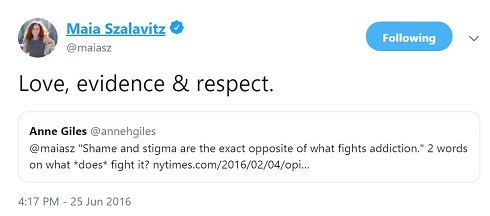If your loved one is receiving medical care and evidence-based counseling for addiction, you have implemented two of the trio of care components recommended by science: medical care, counseling, and support.
To support your loved one, following these suggestions may be helpful.
1) Offer love, evidence-based care, and respect as guided by Maia Szalavitz, neuroscience journalist and author of Unbroken Brain: A Revolutionary New Way of Understanding Addiction.

2) Seek counseling for yourself. Having a loved one with addiction can be traumatizing. Preventing traumatic experiences from deepening into trauma disorders can depend on how you are treated and how you treat yourself. Avoidance beckons but ultimately harms rather than helps. Guidance from professionals trained in trauma recovery can help you approach and deal with the realities of your particular situation.
3) Counteract your loved one’s internalized stigma and fight society’s stigmatization of addiction by using only science-based terms in reference to your loved one’s condition Although focused primarily on substance use disorders, consider consulting Changing the Narrative, a guide to using accurate language about addiction from the Health in Justice Action Lab at Northeastern University.
4) Take care to avoid attributing the presence of addiction to personal, moral, or character traits. That is not accurate, causes setbacks, and does harm. Although the origins and functioning of addiction in each individual’s brain are complex and unique, at essence, addiction is the performance of over-learned behavior without thought (often termed “brain automaticity“) despite negative consequences. With the assistance of medical care – including, perhaps, medications – counseling, and support, the individual may be able to become conscious of the learned process and alter it.
For more suggestions, please consider:
- How to Help a Loved One with Addiction: An Evidence-Informed Approach
- How to Help People With Addiction Who Are Mandated to Abstinence
If I can be of service in any way, please do not hesitate to contact me.
With regard to opioid use disorder
- What Sciences Says to Do If Your Loved One Has an Opioid Addiction, Maia Szalavitz
- A Foster Child of the Opioid Epidemic, Lisa Marie Basile
Last updated 1/16/20
The views expressed are mine alone and do not necessarily reflect the positions of my colleagues, clients, family members, or friends. This content is for informational purposes only and is not a substitute for medical or professional advice. Consult a qualified health care professional for personalized medical and professional advice.

